HIST 115: Analysis of Eakin Review Questions on Latin American History
VerifiedAdded on 2022/08/08
|5
|1215
|404
Homework Assignment
AI Summary
This homework assignment provides answers to review questions from Chapter 21 of Eakin's American History, focusing on Latin American history. The assignment explores the differences between countries that underwent reform versus revolution, with examples from Argentina, Uruguay, Chile, and Costa Rica. It examines the political and economic factors that shaped these nations, including Uruguay's unique political system and economic protectionism. The assignment delves into the rise and fall of political figures such as Salvador Allende and Jose Figures, and analyzes factors leading to instability in Argentina and the success of Costa Rica. Key topics include the Tupamaros, the impact of World War II and the Great Depression, and the political landscapes of Chile and Costa Rica, offering insights into their social, economic, and political developments.
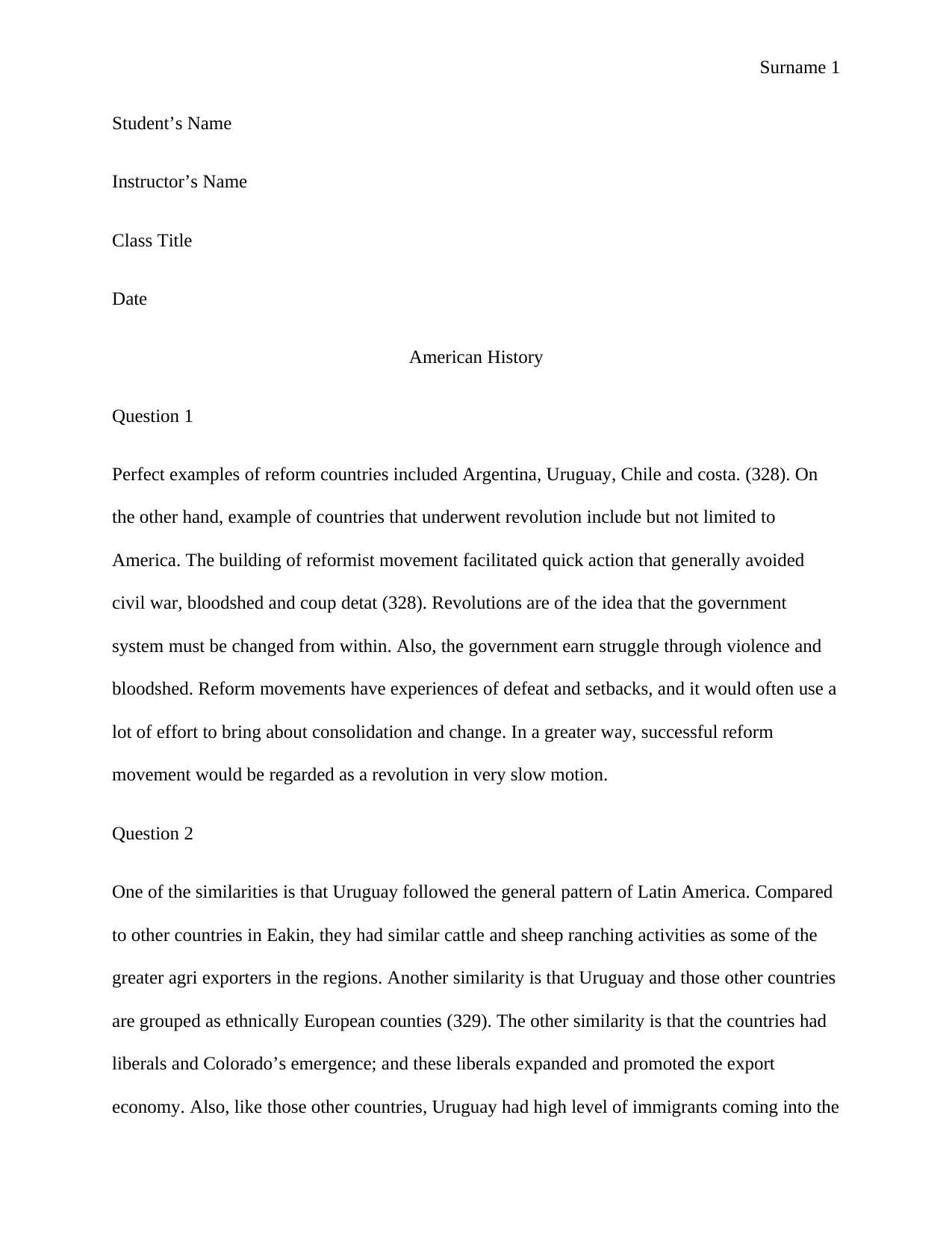
Surname 1
Student’s Name
Instructor’s Name
Class Title
Date
American History
Question 1
Perfect examples of reform countries included Argentina, Uruguay, Chile and costa. (328). On
the other hand, example of countries that underwent revolution include but not limited to
America. The building of reformist movement facilitated quick action that generally avoided
civil war, bloodshed and coup detat (328). Revolutions are of the idea that the government
system must be changed from within. Also, the government earn struggle through violence and
bloodshed. Reform movements have experiences of defeat and setbacks, and it would often use a
lot of effort to bring about consolidation and change. In a greater way, successful reform
movement would be regarded as a revolution in very slow motion.
Question 2
One of the similarities is that Uruguay followed the general pattern of Latin America. Compared
to other countries in Eakin, they had similar cattle and sheep ranching activities as some of the
greater agri exporters in the regions. Another similarity is that Uruguay and those other countries
are grouped as ethnically European counties (329). The other similarity is that the countries had
liberals and Colorado’s emergence; and these liberals expanded and promoted the export
economy. Also, like those other countries, Uruguay had high level of immigrants coming into the
Student’s Name
Instructor’s Name
Class Title
Date
American History
Question 1
Perfect examples of reform countries included Argentina, Uruguay, Chile and costa. (328). On
the other hand, example of countries that underwent revolution include but not limited to
America. The building of reformist movement facilitated quick action that generally avoided
civil war, bloodshed and coup detat (328). Revolutions are of the idea that the government
system must be changed from within. Also, the government earn struggle through violence and
bloodshed. Reform movements have experiences of defeat and setbacks, and it would often use a
lot of effort to bring about consolidation and change. In a greater way, successful reform
movement would be regarded as a revolution in very slow motion.
Question 2
One of the similarities is that Uruguay followed the general pattern of Latin America. Compared
to other countries in Eakin, they had similar cattle and sheep ranching activities as some of the
greater agri exporters in the regions. Another similarity is that Uruguay and those other countries
are grouped as ethnically European counties (329). The other similarity is that the countries had
liberals and Colorado’s emergence; and these liberals expanded and promoted the export
economy. Also, like those other countries, Uruguay had high level of immigrants coming into the
Paraphrase This Document
Need a fresh take? Get an instant paraphrase of this document with our AI Paraphraser
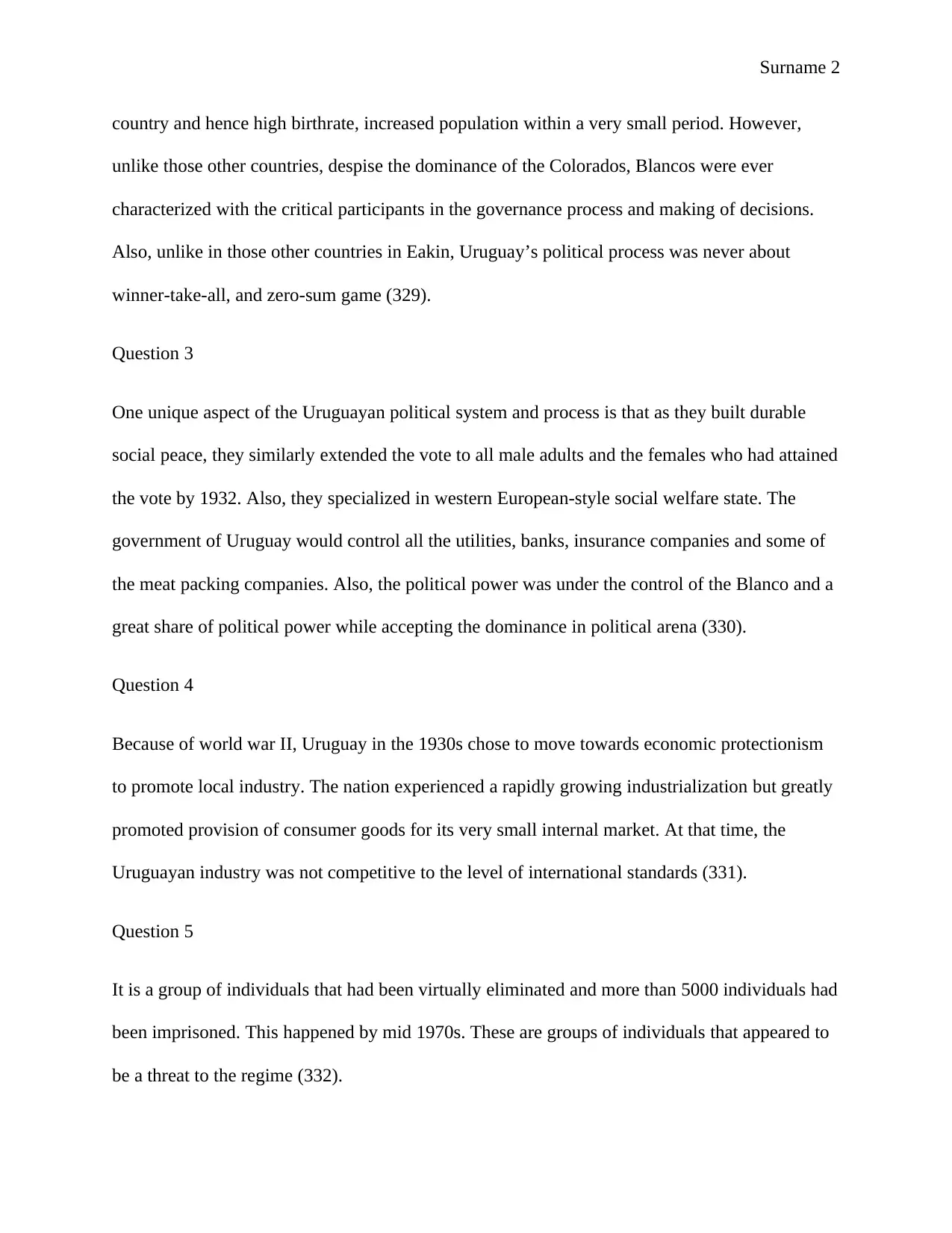
Surname 2
country and hence high birthrate, increased population within a very small period. However,
unlike those other countries, despise the dominance of the Colorados, Blancos were ever
characterized with the critical participants in the governance process and making of decisions.
Also, unlike in those other countries in Eakin, Uruguay’s political process was never about
winner-take-all, and zero-sum game (329).
Question 3
One unique aspect of the Uruguayan political system and process is that as they built durable
social peace, they similarly extended the vote to all male adults and the females who had attained
the vote by 1932. Also, they specialized in western European-style social welfare state. The
government of Uruguay would control all the utilities, banks, insurance companies and some of
the meat packing companies. Also, the political power was under the control of the Blanco and a
great share of political power while accepting the dominance in political arena (330).
Question 4
Because of world war II, Uruguay in the 1930s chose to move towards economic protectionism
to promote local industry. The nation experienced a rapidly growing industrialization but greatly
promoted provision of consumer goods for its very small internal market. At that time, the
Uruguayan industry was not competitive to the level of international standards (331).
Question 5
It is a group of individuals that had been virtually eliminated and more than 5000 individuals had
been imprisoned. This happened by mid 1970s. These are groups of individuals that appeared to
be a threat to the regime (332).
country and hence high birthrate, increased population within a very small period. However,
unlike those other countries, despise the dominance of the Colorados, Blancos were ever
characterized with the critical participants in the governance process and making of decisions.
Also, unlike in those other countries in Eakin, Uruguay’s political process was never about
winner-take-all, and zero-sum game (329).
Question 3
One unique aspect of the Uruguayan political system and process is that as they built durable
social peace, they similarly extended the vote to all male adults and the females who had attained
the vote by 1932. Also, they specialized in western European-style social welfare state. The
government of Uruguay would control all the utilities, banks, insurance companies and some of
the meat packing companies. Also, the political power was under the control of the Blanco and a
great share of political power while accepting the dominance in political arena (330).
Question 4
Because of world war II, Uruguay in the 1930s chose to move towards economic protectionism
to promote local industry. The nation experienced a rapidly growing industrialization but greatly
promoted provision of consumer goods for its very small internal market. At that time, the
Uruguayan industry was not competitive to the level of international standards (331).
Question 5
It is a group of individuals that had been virtually eliminated and more than 5000 individuals had
been imprisoned. This happened by mid 1970s. These are groups of individuals that appeared to
be a threat to the regime (332).
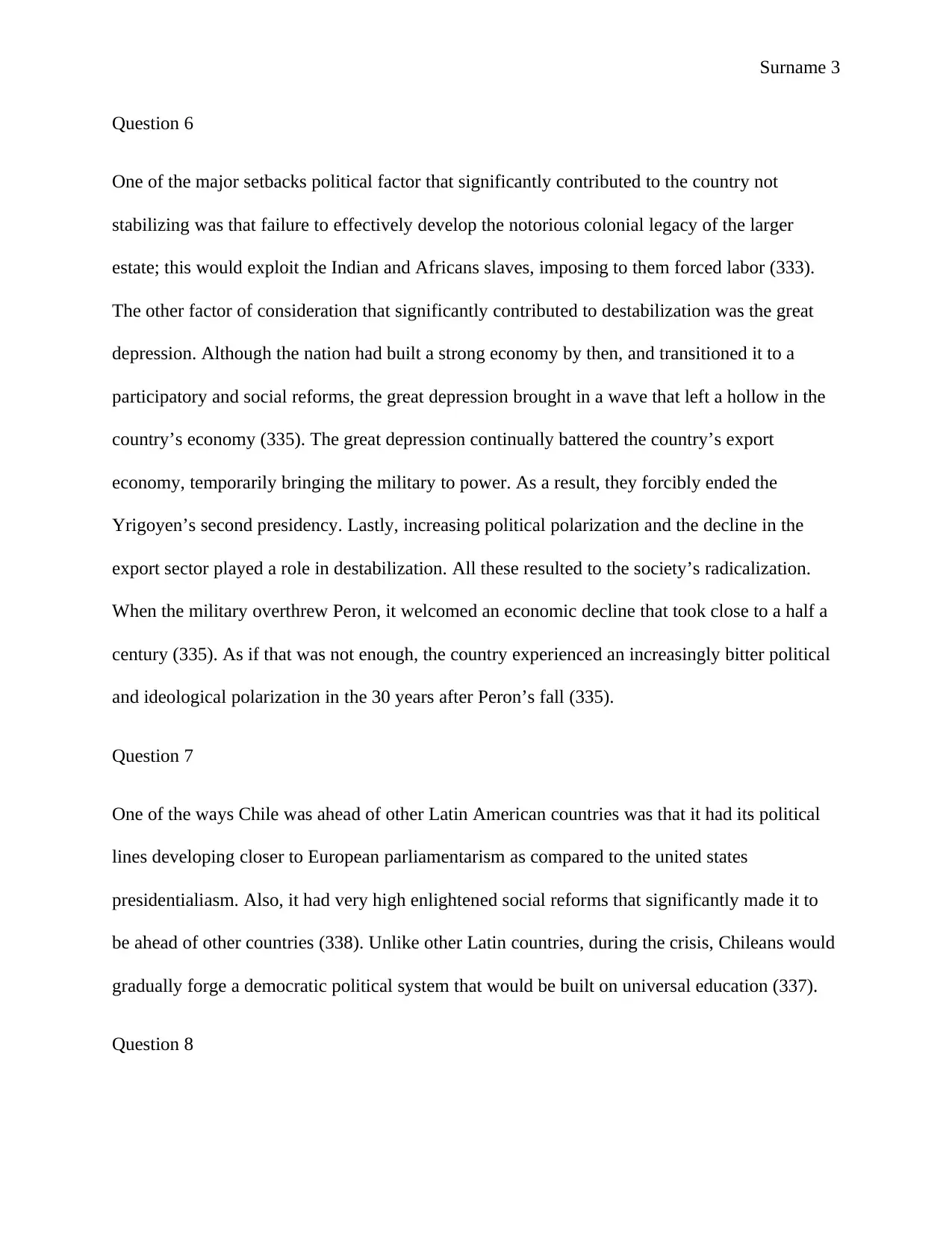
Surname 3
Question 6
One of the major setbacks political factor that significantly contributed to the country not
stabilizing was that failure to effectively develop the notorious colonial legacy of the larger
estate; this would exploit the Indian and Africans slaves, imposing to them forced labor (333).
The other factor of consideration that significantly contributed to destabilization was the great
depression. Although the nation had built a strong economy by then, and transitioned it to a
participatory and social reforms, the great depression brought in a wave that left a hollow in the
country’s economy (335). The great depression continually battered the country’s export
economy, temporarily bringing the military to power. As a result, they forcibly ended the
Yrigoyen’s second presidency. Lastly, increasing political polarization and the decline in the
export sector played a role in destabilization. All these resulted to the society’s radicalization.
When the military overthrew Peron, it welcomed an economic decline that took close to a half a
century (335). As if that was not enough, the country experienced an increasingly bitter political
and ideological polarization in the 30 years after Peron’s fall (335).
Question 7
One of the ways Chile was ahead of other Latin American countries was that it had its political
lines developing closer to European parliamentarism as compared to the united states
presidentialiasm. Also, it had very high enlightened social reforms that significantly made it to
be ahead of other countries (338). Unlike other Latin countries, during the crisis, Chileans would
gradually forge a democratic political system that would be built on universal education (337).
Question 8
Question 6
One of the major setbacks political factor that significantly contributed to the country not
stabilizing was that failure to effectively develop the notorious colonial legacy of the larger
estate; this would exploit the Indian and Africans slaves, imposing to them forced labor (333).
The other factor of consideration that significantly contributed to destabilization was the great
depression. Although the nation had built a strong economy by then, and transitioned it to a
participatory and social reforms, the great depression brought in a wave that left a hollow in the
country’s economy (335). The great depression continually battered the country’s export
economy, temporarily bringing the military to power. As a result, they forcibly ended the
Yrigoyen’s second presidency. Lastly, increasing political polarization and the decline in the
export sector played a role in destabilization. All these resulted to the society’s radicalization.
When the military overthrew Peron, it welcomed an economic decline that took close to a half a
century (335). As if that was not enough, the country experienced an increasingly bitter political
and ideological polarization in the 30 years after Peron’s fall (335).
Question 7
One of the ways Chile was ahead of other Latin American countries was that it had its political
lines developing closer to European parliamentarism as compared to the united states
presidentialiasm. Also, it had very high enlightened social reforms that significantly made it to
be ahead of other countries (338). Unlike other Latin countries, during the crisis, Chileans would
gradually forge a democratic political system that would be built on universal education (337).
Question 8
⊘ This is a preview!⊘
Do you want full access?
Subscribe today to unlock all pages.

Trusted by 1+ million students worldwide
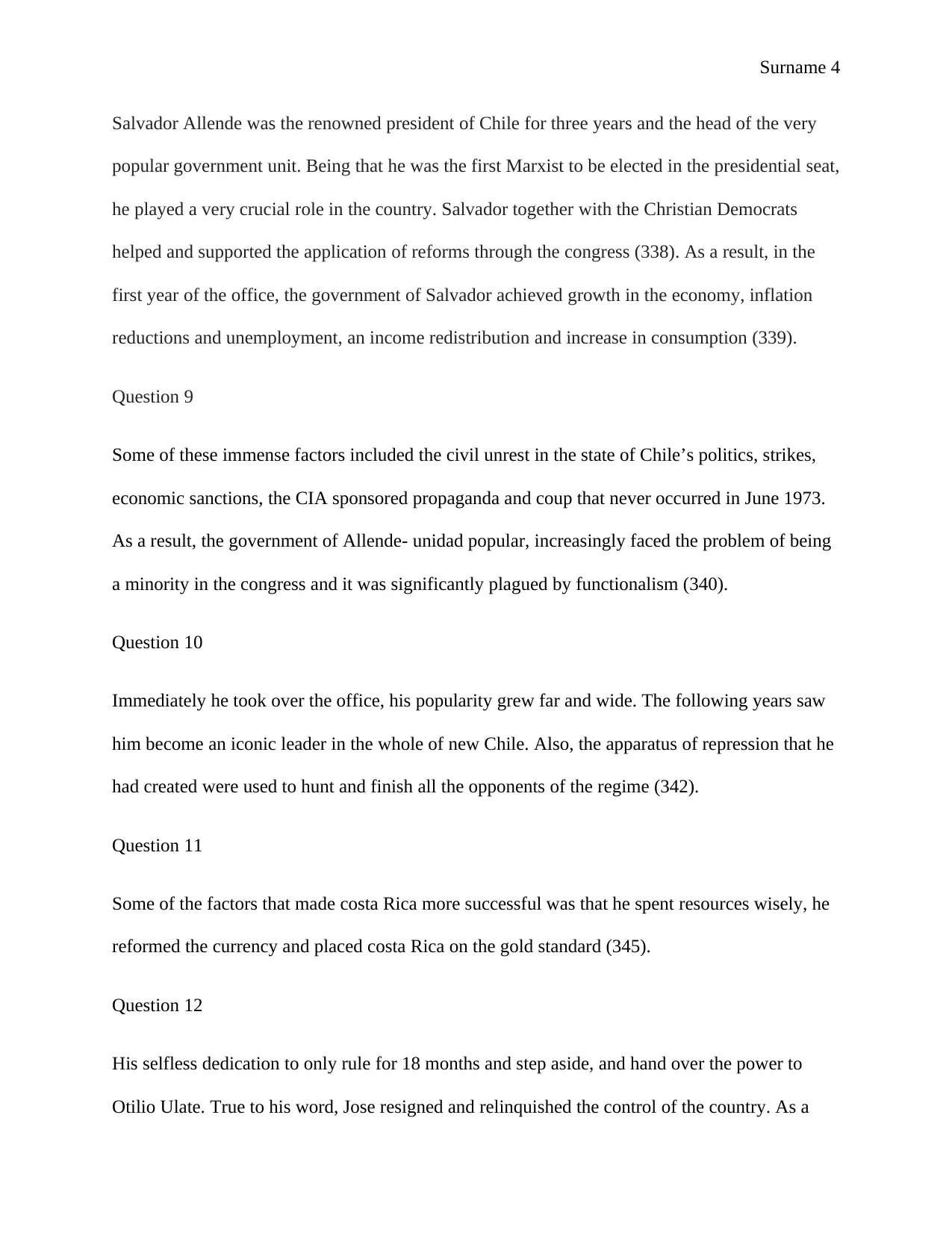
Surname 4
Salvador Allende was the renowned president of Chile for three years and the head of the very
popular government unit. Being that he was the first Marxist to be elected in the presidential seat,
he played a very crucial role in the country. Salvador together with the Christian Democrats
helped and supported the application of reforms through the congress (338). As a result, in the
first year of the office, the government of Salvador achieved growth in the economy, inflation
reductions and unemployment, an income redistribution and increase in consumption (339).
Question 9
Some of these immense factors included the civil unrest in the state of Chile’s politics, strikes,
economic sanctions, the CIA sponsored propaganda and coup that never occurred in June 1973.
As a result, the government of Allende- unidad popular, increasingly faced the problem of being
a minority in the congress and it was significantly plagued by functionalism (340).
Question 10
Immediately he took over the office, his popularity grew far and wide. The following years saw
him become an iconic leader in the whole of new Chile. Also, the apparatus of repression that he
had created were used to hunt and finish all the opponents of the regime (342).
Question 11
Some of the factors that made costa Rica more successful was that he spent resources wisely, he
reformed the currency and placed costa Rica on the gold standard (345).
Question 12
His selfless dedication to only rule for 18 months and step aside, and hand over the power to
Otilio Ulate. True to his word, Jose resigned and relinquished the control of the country. As a
Salvador Allende was the renowned president of Chile for three years and the head of the very
popular government unit. Being that he was the first Marxist to be elected in the presidential seat,
he played a very crucial role in the country. Salvador together with the Christian Democrats
helped and supported the application of reforms through the congress (338). As a result, in the
first year of the office, the government of Salvador achieved growth in the economy, inflation
reductions and unemployment, an income redistribution and increase in consumption (339).
Question 9
Some of these immense factors included the civil unrest in the state of Chile’s politics, strikes,
economic sanctions, the CIA sponsored propaganda and coup that never occurred in June 1973.
As a result, the government of Allende- unidad popular, increasingly faced the problem of being
a minority in the congress and it was significantly plagued by functionalism (340).
Question 10
Immediately he took over the office, his popularity grew far and wide. The following years saw
him become an iconic leader in the whole of new Chile. Also, the apparatus of repression that he
had created were used to hunt and finish all the opponents of the regime (342).
Question 11
Some of the factors that made costa Rica more successful was that he spent resources wisely, he
reformed the currency and placed costa Rica on the gold standard (345).
Question 12
His selfless dedication to only rule for 18 months and step aside, and hand over the power to
Otilio Ulate. True to his word, Jose resigned and relinquished the control of the country. As a
Paraphrase This Document
Need a fresh take? Get an instant paraphrase of this document with our AI Paraphraser
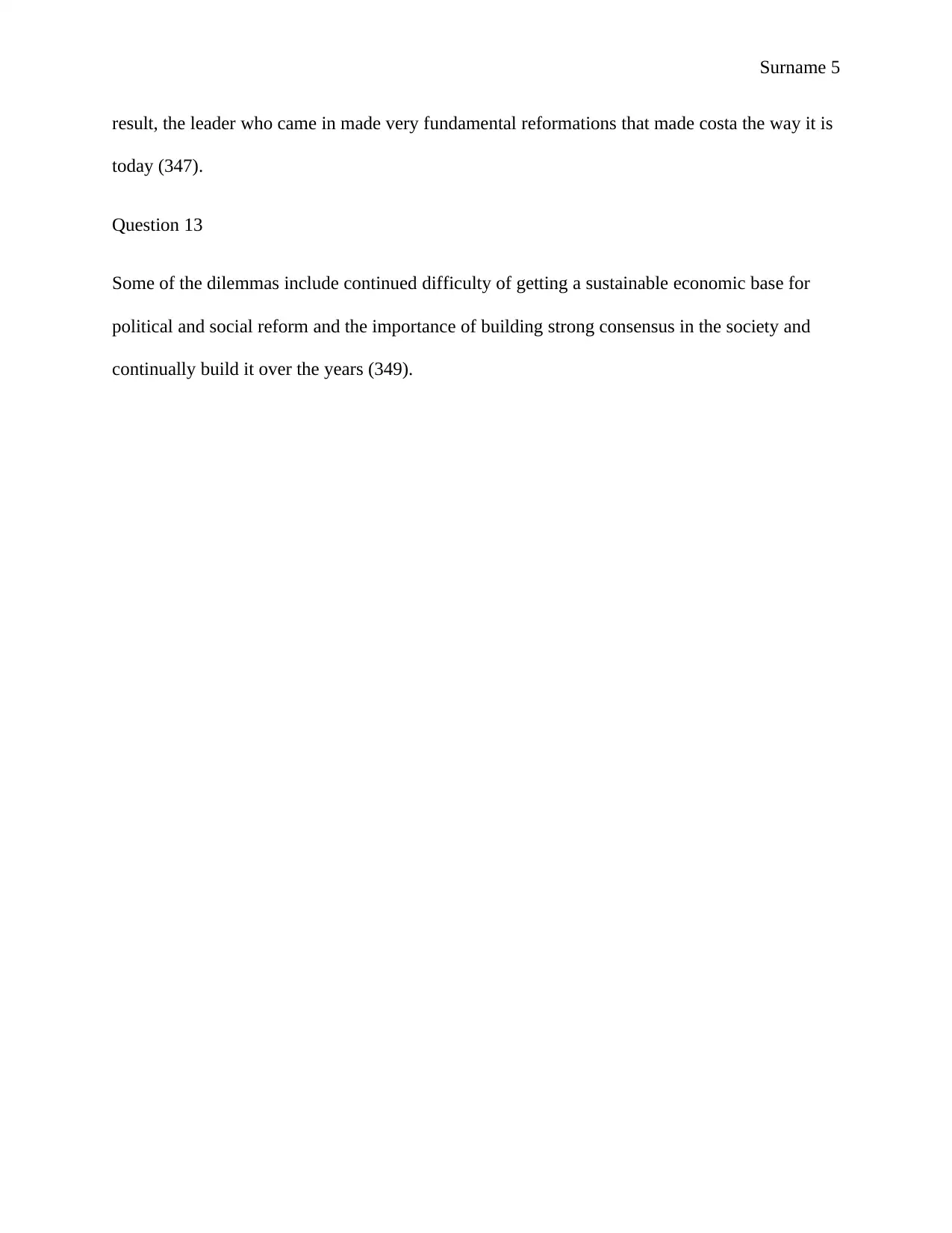
Surname 5
result, the leader who came in made very fundamental reformations that made costa the way it is
today (347).
Question 13
Some of the dilemmas include continued difficulty of getting a sustainable economic base for
political and social reform and the importance of building strong consensus in the society and
continually build it over the years (349).
result, the leader who came in made very fundamental reformations that made costa the way it is
today (347).
Question 13
Some of the dilemmas include continued difficulty of getting a sustainable economic base for
political and social reform and the importance of building strong consensus in the society and
continually build it over the years (349).
1 out of 5
Your All-in-One AI-Powered Toolkit for Academic Success.
+13062052269
info@desklib.com
Available 24*7 on WhatsApp / Email
![[object Object]](/_next/static/media/star-bottom.7253800d.svg)
Unlock your academic potential
Copyright © 2020–2026 A2Z Services. All Rights Reserved. Developed and managed by ZUCOL.
